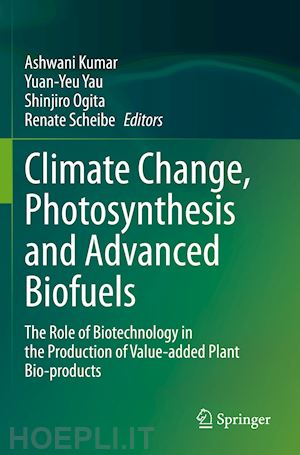
Questo prodotto usufruisce delle SPEDIZIONI GRATIS
selezionando l'opzione Corriere Veloce in fase di ordine.
Pagabile anche con Carta della cultura giovani e del merito, 18App Bonus Cultura e Carta del Docente
The use of fossil fuels results in rising CO2 and other greenhouse gas (GHG) emissions, causing global temperature rise and climate change that will negatively impact human health, the food supply, and eventually worsen hunger and misery. Presently, fossil fuels meet 88% of the energy demand, resulting in rising CO2/GHG emissions at alarming rates. The increased use of biofuels would help to mitigate climate change. Efficiently designing methods for the production of biofuels and plant-derived high-value products requires a deeper understanding of photosynthetic processes as a prerequisite for applying novel biotechnologies. Accordingly, this book provides ample information and a wealth of illustrative examples.
The book’s eighteen richly illustrated chapters are divided into three thematic parts. I: Photosynthesis and Biomass Production under Changing Conditions, II: Microalgae and Engineered Crops for Production of Biofuels and High-value Products, and III: Genetic Resources and Engineering Methods to Improve Crop Plants. Readers will find the latest information on the molecular basis of photosynthetic processes in plants (including the regulatory principles that allow plants to maintain homeostasis under changing conditions), stress resistance and synthetic pathways. In addition, the basic principles of important biotechnologies, as well as examples of specially designed crops capable of growing under stress conditions with improved productivity, are presented.
The book sets the course for future research in the field of biofuel development and production and provides both general and specific information for students, teachers, academic researchers, industrial teams, and general readers who are interested in new developments concerning the production of biofuels with value-added properties.
Dr. Ashwani KUMAR is an Alexander von Humboldt Fellow (Germany) and Professor Emeritus, Department of Botany, University of Rajasthan, Jaipur, India. He initially worked with Professor Dr. K. H. Neumann at the Institute of Plant Nutrition, Justus Liebig University Giessen, Germany, on the photosynthetic apparatus in vitro and in vivo, and subsequently with Professor Dr. Sven Schubert on the physiology and role of enzymes in salinity stress resistance with support from an Alexander von Humboldt Fellowship. A former JSPS visiting professor to Japan, Dr. Kumar has published 220 research papers and 23 books. Currently, he is the President of the Indian Botanical Society.
Dr. Yuan-Yeu YAU (aka Frank Yau) received his B.Sc. in Botany from National Taiwan University (NTU) in Taiwan, and received his Master and Ph.D. from the University of Wisconsin, Madison, USA. He subsequently worked at the University of California Berkeley and the Plant Gene Expression Center (USDA-ARS) in Albany (California, USA); the Chinese Academy of Sciences (Full Professor); and Northeastern State University (Oklahoma, USA). His work focuses on developing clean-gene technologies using microbial site-specific recombination (SSR). He has also worked on cotton transformation and the production of anti-stroke drugs using molecular farming. He is an active member of Research Gate, a professional network for scientists and researchers.
Dr. Shinjiro OGITA has over two decades of experience in the field of plant biotechnology. In 1992, he began his research career as a master student at the Graduate School of Agriculture, Tokyo University of Agriculture and Technology (TUAT), Japan. In 1997, he received his Ph.D. in Agriculture from the United Graduate School of Agriculture, TUAT, Japan. He is an expert on cell and tissue cultures, and on transformation technologies for higher plants. He iscurrently a full professor and director of the Field Sciences Center, Prefectural University of Hiroshima (PUH), Japan.
Dr. Renate SCHEIBE held the Chair of Plant Physiology until 2019, teaching on all aspects of plant physiology. Her research chiefly focuses on redox-regulation and energy metabolism; her interests include the molecular mechanisms for maintenance of redox-homeostasis in connection with stress adaptation, which she explores using approaches ranging from protein chemistry and enzymology, to ecophysiology. She has published more than 160 papers, and is now actively contributing to the scientific community with editorial tasks and as a member of the German Research Integrity group. She was elected as a Corresponding Member of the American Society of Plant Biologists and an Honorary Member of the German Botanical Society.











Il sito utilizza cookie ed altri strumenti di tracciamento che raccolgono informazioni dal dispositivo dell’utente. Oltre ai cookie tecnici ed analitici aggregati, strettamente necessari per il funzionamento di questo sito web, previo consenso dell’utente possono essere installati cookie di profilazione e marketing e cookie dei social media. Cliccando su “Accetto tutti i cookie” saranno attivate tutte le categorie di cookie. Per accettare solo deterninate categorie di cookie, cliccare invece su “Impostazioni cookie”. Chiudendo il banner o continuando a navigare saranno installati solo cookie tecnici. Per maggiori dettagli, consultare la Cookie Policy.